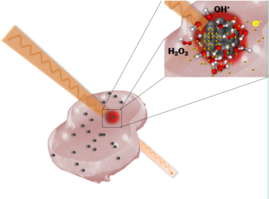Accueil > Production Scientifique > Thèses soutenues > Année 2014 > Soutenance de thèse de Sha LI (4 avril 2014)
Soutenance de thèse de Sha LI (4 avril 2014)
Institut des Sciences Moléculaires d’Orsay (ISMO), Orsay
“Potency of nanoparticles to amplify radiation effects
revealed in radioresistant bacteria”
The addition of nanoparticles (NPs) is proposed as a novel strategy to amplify the radiations effects in the tumors (radiosensitization). It was found that radiosensitizers such as platinum, gold and gadolinium nanoparticles enhance the lethal effect of ionizing radiations (fast ions and gamma rays) in mammalian cells. This is attributed to a multiscale cascade of events, which includes the NPs activation and relaxation, the production of water radicals up that induce the biological damage and cell killing.

It is not clear yet what from the early stage processes or from the (eukaryotic) cell response is the key stage of the radiosensitization. Hence, the challenge of this work was to probe the radiosensitizing effects of gold, platinum and gadolinium based nanoparticles on cells other than eukaryotic cells. For the first time, their effect was tested on the most radioresistant bacterium ever reported Deinoccocus radiodurans (D. radiodurans). For comparison, the nanoparticles were tested on the radiosensitive bacterium E.coli. Studies performed at molecular scale were used to understand the elementary mechanisms.
In summary, throughout this study, a set of standard methods was established to evaluate the cellular uptake and the toxicity of the potential nanodrugs. This work demonstrated that the radiosensitizing nanoparticles amplify the effects of gamma rays in radiosensitive but also in radioresistant bacteria. This is attributed to the production of radical clusters and to the induction of nano-size biodamages in DNA but also in repair proteins. Finally, this work proves that the radiosensitization is a “universal” phenomenon that can take place in all living organisms.
|
Affiche de Sha LI - 247.6 kio |
Dans la même rubrique :
- de Maxime DEBIOSSAC (13 novembre 2014)
- de Rachid Tchalala (24 cotobre 2014)
- de Mayssa Yengui (29 octobre 2014)
- de Rudy Desmarchelier (4 juillet 2014)
- de Juanjuan JIA (4 juillet 2014)
- de Siddharth Sivankutty (11 juin 2014)
- de Mohammad ALSHORMAN (25 février 2014)
- de Sonia Marggi Poullain (14 janvier 2014)
- de Benoît ROGEZ (16 décembre 2014)


